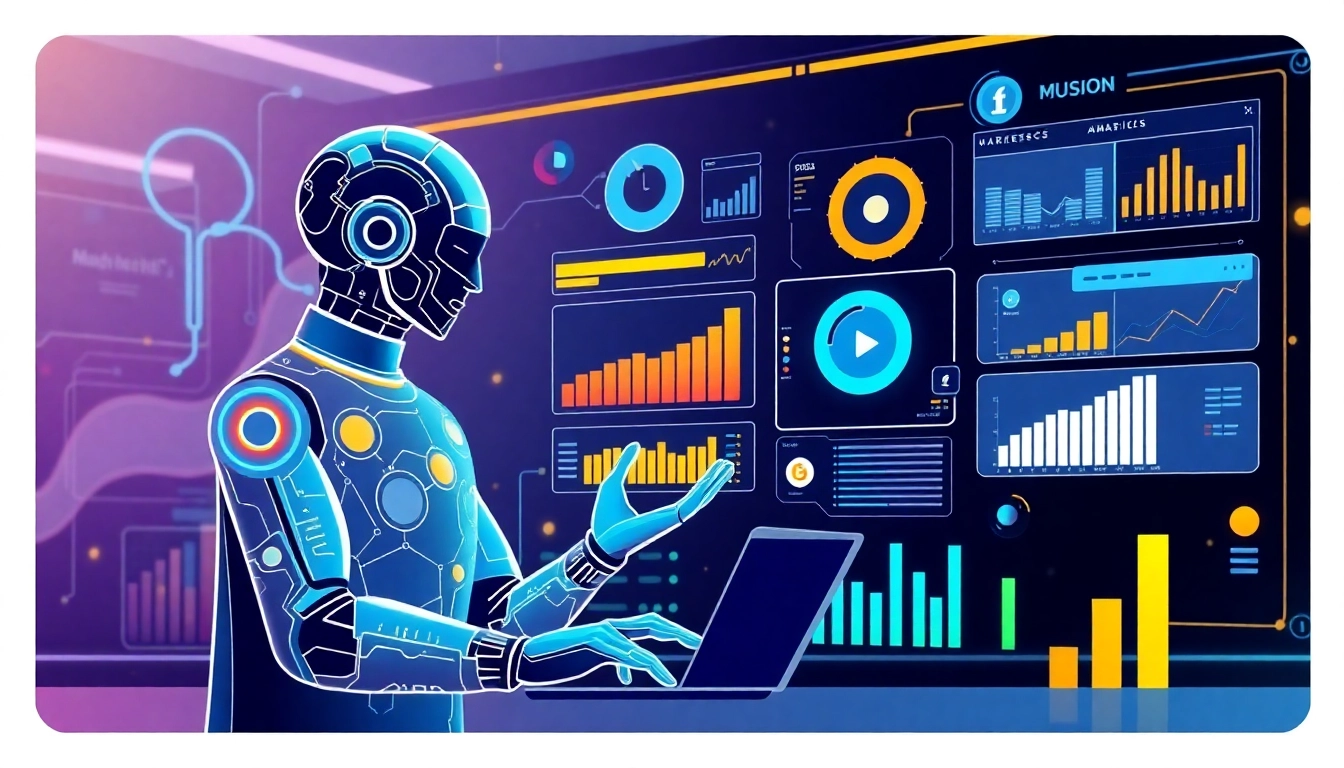Understanding AI Marketing Agents
What Are AI Marketing Agents?
AI marketing agents are sophisticated software programs powered by artificial intelligence designed to streamline various marketing tasks. These autonomous entities can analyze vast datasets, execute marketing campaigns, and provide insights that would typically require human intervention. In essence, they augment traditional marketing strategies by delivering a level of speed and accuracy that greatly enhances operational efficiency. Their capabilities encompass everything from targeting audiences to analyzing performance, thereby reshaping how businesses approach their marketing efforts. Companies leveraging AI marketing agents often report improved conversion rates, better customer engagement, and cost-effective campaigns.
Key Features and Capabilities
One of the most compelling aspects of AI marketing agents is their multifaceted capabilities. These agents come equipped with a range of features that empower marketing teams. Key functionalities typically include:
- Data Analysis: AI can process large amounts of data, identifying patterns and providing insights that inform marketing strategies.
- Customer Segmentation: By analyzing demographic and behavioral data, AI marketing agents can categorize customers into segments, tailoring messaging for maximized resonance and engagement.
- Personalization: AI agents can create customized messages and content for individual users, enhancing customer experience and likelihood of conversion.
- Real-time Campaign Management: These agents can monitor ongoing campaigns and make adjustments in real-time based on performance metrics.
- Predictive Analytics: By utilizing historical data, AI marketing agents can predict future trends, enabling businesses to stay ahead in a competitive market.
Benefits of Using AI Marketing Agents
The advantages of implementing AI marketing agents are vast. They not only save time but also reduce costs and increase efficiency. Key benefits include:
- Enhanced Efficiency: Automated processes allow marketing teams to focus on strategic initiatives instead of mundane tasks, fostering a more productive environment.
- Improved Decision-Making: With access to data-driven insights, businesses can make better-informed strategic decisions.
- Scalability: AI marketing agents can easily scale operations as business needs increase, accommodating growth without a proportional increase in manpower.
- 24/7 Availability: Unlike human employees, AI agents can operate around the clock, managing campaigns and engaging with customers at any time.
- Cost Reduction: Automation leads to less operational overhead, translating to significant cost savings.
Types of AI Marketing Agents
Predictive Analytics Agents
Predictive analytics agents leverage historical data to forecast future trends and behaviors. By analyzing customer data, these agents can identify purchasing patterns, thereby predicting which products or services are likely to appeal to specific segments of the audience. This capability allows marketers to allocate their resources more effectively, optimizing their marketing strategies based on anticipated outcomes.
Content Creation Agents
Content creation agents utilize natural language processing and machine learning algorithms to generate marketing content. These agents can create everything from blog posts to social media updates, ensuring that content is both relevant and optimized for search engines. By streamlining the content creation process, businesses can maintain a consistent online presence and engage their audience with minimal effort.
Customer Interaction Agents
Customer interaction agents, often embodied in chatbots or virtual assistants, are designed to engage with customers in real-time. These agents can answer questions, provide recommendations, and assist in completing transactions, thereby enhancing customer service. Their ability to provide personalized interactions contributes to increased satisfaction and loyalty among customers.
How to Implement AI Marketing Agents
Assessing Your Marketing Needs
The first step in implementing AI marketing agents involves a thorough assessment of your current marketing processes and goals. Determine what specific tasks you wish to automate and identify pain points within your existing marketing strategies. This analysis will provide a roadmap for how AI can best serve your organization.
Selecting the Right AI Solution
With numerous AI solutions available in the market, selecting the right one requires careful consideration of various factors such as functionality, ease of integration, and cost. It’s essential to choose a solution that aligns not only with your immediate needs but also with your long-term marketing strategy. Take the time to evaluate user reviews and case studies to identify products that have had a positive impact on similar businesses.
Integration Best Practices
Once an AI solution has been selected, the next step is integration. This process should be managed carefully to ensure all tools are configured correctly. Best practices for integration include:
- Involve Stakeholders: Engaging relevant team members will help to identify potential barriers and ensure smooth integration.
- Conduct Training: A comprehensive training for marketing staff on how to effectively use the new AI tools can lead to better adoption.
- Monitor Performance: After implementation, it’s crucial to monitor the performance of the AI marketing agents closely, addressing any issues that arise promptly.
Measuring Success with AI Marketing Agents
Key Performance Indicators (KPIs)
To evaluate the effectiveness of AI marketing agents, it is crucial to establish relevant Key Performance Indicators (KPIs). These may include metrics such as conversion rates, customer engagement levels (e.g., clicks, opens, interactions), and ROI on marketing campaigns. Monitoring these indicators will provide insights into how well the AI agents are performing and uncover areas that may require adjustments.
Data Analysis and Reporting
Data analysis plays a pivotal role in understanding the impact of AI marketing agents on your campaigns. Utilize analytics tools to generate comprehensive reports that assess the effectiveness of your AI-driven strategies. Assess the data regularly to make informed decisions and iterate on your marketing approach as needed.
Continuously Optimizing AI Performance
The marketing landscape is ever-changing, and AI marketing agents must adapt to these changes to maintain their effectiveness. Continuous optimization involves regularly updating AI models, retraining them with fresh data, and iterating on marketing strategies based on performance insights. This proactive approach will help ensure that your AI marketing agents remain aligned with business goals and market demands.
The Future of AI Marketing Agents
Emerging Trends and Technologies
The future of AI marketing agents looks promising, with ongoing advancements in AI technology that will enable even greater capabilities. Emerging trends include personalized marketing experiences powered by more sophisticated AI algorithms, increased use of voice search and conversational interfaces, and enhanced machine learning models that can learn from fewer data points, making them more accessible to smaller businesses.
Anticipating Market Changes
As technology continues to evolve, so too will consumer behaviors and expectations. Businesses must be agile in adapting their marketing strategies to counter emerging trends. AI-driven tools will likely be at the forefront, helping companies not only to analyze incoming data but to predict shifts in consumer sentiment, preferences, and market viability.
Staying Competitive with AI Innovations
To maintain a competitive edge, businesses must not only adopt AI marketing agents but also innovate constantly. This includes staying updated on the latest advancements in AI, exploring new applications, and regularly testing different marketing strategies. By fostering a culture of innovation and remaining committed to leveraging AI, companies can ensure they stay ahead in a rapidly changing digital landscape.



